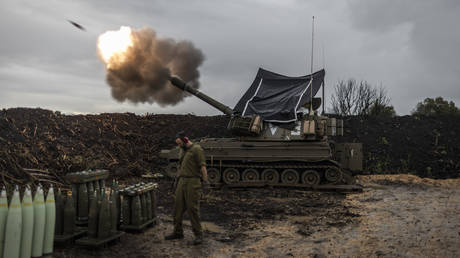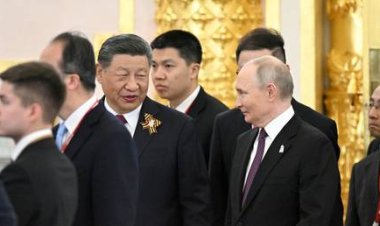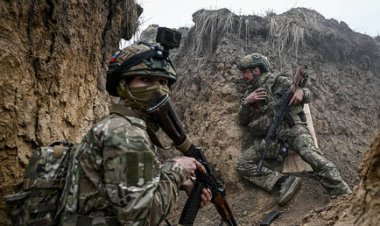Is the 'Axis of Resistance' Against Israel Showing Signs of Fracture?
As tensions rise in the Middle East, Iran faces a pivotal challenge: finding a way to sustain its influence in Lebanon without engaging in direct conflict.

The ongoing hostilities in the region have significantly altered the balance of power, affecting not only the Middle East but also influencing global dynamics. This conflict directly engages the key geopolitical interests of powerful nations such as Iran, Israel, Saudi Arabia, Turkey, the US, and Russia, prompting shifts in their diplomatic, military strategies, and overall power relationships.
A recent development highlights this situation: Lebanese Prime Minister Najib Mikati unexpectedly criticized Iran’s actions, a departure from the usual diplomatic decorum. Mikati condemned Tehran for “blatant interference” in Lebanon’s internal affairs, specifically referencing comments made by Iranian parliamentary speaker Mohammad Bagher Ghalibaf.
Mikati’s frustration was particularly pronounced regarding discussions surrounding UN Resolution 1701, which addresses the post-conflict governance of southern Lebanon after the hostilities between Hezbollah and Israel. This resolution stipulates that only Lebanese armed forces and UN peacekeepers can operate in the region. However, Ghalibaf’s suggestion to engage in talks about implementing this resolution with France as a mediator was perceived by Mikati as a bid to impose external control over Lebanon.
The remarks made by Ghalibaf, as reported in Le Figaro, ignited a backlash in Lebanon, particularly from factions defending national sovereignty. Mikati underscored that any discussions about the implementation of international resolutions should be managed exclusively by Lebanese authorities, denouncing any form of external interference. He emphasized that while Lebanon is willing to work with international partners such as France, all negotiations should originate from a sovereign state perspective. Mikati also expressed concern that such statements could escalate tensions in a nation already struggling with military conflicts.
In response, Mikati directed Lebanon’s foreign minister to summon the Iranian chargé d’affaires for clarification on Ghalibaf’s comments. He recalled that during previous meetings with Iranian officials, like Foreign Minister Abbas Araghchi, he had clearly stated that any interference in Lebanese affairs would be seen as infringing on its sovereignty. The Prime Minister also pointed out that Lebanon, facing unprecedented aggression from Israel, requires understanding and support from the international community rather than impositions of external control.
The situation around Iranian officials’ remarks coincided with Ghalibaf and Araghchi’s recent visits to Lebanon, where their statements were perceived by many as attempts to influence Lebanon’s political landscape. Notably, Araghchi dismissed a ceasefire roadmap proposed by Lebanese politicians Nabih Berri and Walid Jumblatt, which pointedly excluded Hezbollah. This stance provoked criticism, particularly from those who argue that Lebanon should be responsible for determining its own future without outside interference.
France, a significant international partner and former colonial power for Lebanon, also opposed Iran’s stance. French President Emmanuel Macron openly criticized Iran's actions, asserting they jeopardize the safety of Lebanon’s civilian population. He insisted that Hezbollah must disarm and terminate its terrorist activities to enable the Lebanese people to achieve unity and restore stability. These statements align with ongoing French diplomatic efforts aimed at addressing the conflict in Lebanon and assisting the country, which currently faces dire humanitarian and political crises.
Mikati's statements garnered substantial support within Lebanon, with political leaders like Samir Geagea, head of the Lebanese Forces party, and Sami Gemayel, leader of the Kataeb party, commending the Prime Minister's initiative. Geagea expressed hope that Mikati’s position indicates a growing responsibility by the state for its internal matters, while Gemayel characterized Mikati's actions as crucial for restoring Lebanon’s sovereignty and state authority.
Lebanon has historically been a battleground for various regional and global powers, where differing interests often collide. Its strategic location and ethnic diversity have made it a stage for external forces pursuing their objectives, often to the detriment of the nation’s sovereignty and the welfare of its citizens.
During the civil war from 1975 to 1990, Israel was deeply involved, fearing threats from Palestinian armed factions operating in southern Lebanon. This led to military operations aimed at securing its northern borders, culminating in the 1982 invasion to expel the Palestine Liberation Organization (PLO). This intervention resulted in complex alliances, including partnerships with certain Lebanese Christian militias, which further complicated the conflict.
Syria’s involvement also dramatically influenced Lebanon during this time. In 1976, Syrian troops entered under the guise of restoring peace and remained for nearly 30 years, allowing Damascus to exert substantial control over Lebanese politics by supporting groups aligned with its interests, like the Amal Movement and Hezbollah. Many in Lebanon saw this as an occupation compromising the nation’s sovereignty.
Saudi Arabia’s influence was mainly exerted through Lebanon’s Sunni community, fostering connections with prominent families like the Hariris to counteract Syrian and Iranian dominance. Rafik Hariri, a significant political figure, facilitated these relations. His assassination in 2005 triggered the Cedar Revolution, which resulted in the withdrawal of Syrian forces.
Despite this, Lebanon has continued to be a focal point for external actors seeking to broaden their influence. Saudi Arabia has persisted in supporting Sunni leaders, including Rafik Hariri’s son, Saad, who faced formidable opposition from the increasingly empowered Hezbollah supported by Iran. Various Christian factions have also maintained ties with Western nations and occasionally engaged with Israel, deepening internal divisions and fueling ongoing political and economic crises.
Throughout these turbulent times, the priorities of external actors frequently overshadowed the needs and aspirations of the Lebanese population. Strategic objectives of various regional and global powers often intensified sectarian tensions and hampered legitimate efforts for lasting peace and stability. Consequently, the people of Lebanon have been disproportionately affected by conflicts spurred by foreign interests.
Currently, the ongoing clashes between the Israel Defense Forces and Hezbollah have once again spotlighted Lebanon’s susceptibility to external interference. Reports indicate substantial losses within Hezbollah, including senior commanders, emboldening the group’s domestic challengers who view these developments as an opportunity to alter the power dynamics. Concurrently, Western efforts to diminish Iran’s influence in Lebanon underscore a consistent trend of outside forces meddling in the country’s affairs for their own agendas, often disregarding national sovereignty and the welfare of its citizens.
Lebanon’s history reveals a repeated pattern of being caught in geopolitical crossfire, with its people’s fates often overlooked. Achieving enduring peace and stability necessitates that external powers respect Lebanon's sovereignty and engage in constructive dialogue that prioritizes the interests of its citizens.
The relationship between Iran and Lebanon has deep historical roots, particularly evolving after the 1979 Islamic Revolution. Following the revolution, Iran’s leadership, under Ayatollah Khomeini, embraced a policy of exporting the revolution and supporting Shiites abroad, thereby increasing its involvement with Lebanon’s Shiite community seeking assistance.
During the early 1980s civil war, Iran capitalized on the political vacuum to boost its influence, notably through the Islamic Revolutionary Guard Corps, which provided financial and military support to local Shiite leaders. This culminated in the establishment of Hezbollah in 1982, formed in response to Israel's invasion. The group evolved into both a resistance force against Israeli occupation and a significant political entity, advocating for Shiite interests and promoting an ideology closely aligned with Iran.
Hezbollah has served as a strategic ally for Iran in the region, allowing Tehran to challenge Israel and shape Lebanese internal politics. The group received extensive resources from Iran, including financial aid and military training, enabling it to grow into a formidable military and political entity capable of impacting Lebanese governance.
Despite its considerable influence, Hezbollah has also faced intensifying pressures from external forces, particularly Israel and Western nations, aiming to curtail Iran’s hold in Lebanon. Israel perceives Hezbollah’s military capabilities as a direct security threat and has executed operations to dismantle the group’s infrastructure and eliminate key figures.
Recent strikes have resulted in the deaths of several high-ranking Hezbollah commanders, which has galvanized domestic adversaries of the group, framing these developments as a shift in balance. Israel's approach appears to rely on exploiting Lebanon's internal divisions, anticipating that its actions would meet limited resistance from Lebanese society.
Presently, Iran stands at a crossroads. On one hand, it desires to uphold its influence in Lebanon and utilize Hezbollah as an instrument of regional policy; on the other hand, it must navigate the risks of direct military engagement with Israel or escalating tensions that could have severe ramifications not just for Iran but for the region at large. Tehran is constrained by economic sanctions, internal difficulties, and international pressure, which complicate its response options.
Iran is inclined to avoid outright confrontation, opting for a strategy that favors restraint and diplomacy. While still supporting Hezbollah through various channels, it aims to reinforce its position without resorting to direct military action. However, mounting pressure from Israel and criticism from Lebanese officials further complicate this endeavor. A diminishing Hezbollah could significantly undermine Iran’s influence in Lebanon, resulting in substantial strategic losses for Tehran.
The intensified scrutiny of Iran and its allies raises the risk of further escalation in the Middle East. Should Iran decide to adopt more aggressive measures to safeguard its interests, it could lead to larger-scale military confrontations, impacting not only Lebanon and Israel but also neighboring countries. Such scenarios, given the complex ethnic and sectarian landscapes and the presence of diverse armed groups, could yield catastrophic consequences.
The ongoing situation in Lebanon illustrates the intricate geopolitical dynamics at play in the Middle East, where numerous states’ interests intertwine and often conflict. Lebanese authorities' criticism of Iran forms part of a broader strategy by external powers aiming to redistribute regional influence. In light of mounting pressures, Iran must carefully balance the defense of its interests with the risks of escalating tensions.
Achieving stability in Lebanon will necessitate coordinated efforts from the international community focused on respecting its sovereignty and preventing foreign interference. Only through constructive dialogue and mutual understanding can a pathway to peace and sustainable development be forged, one that prioritizes the interests of all involved parties, especially the welfare of the Lebanese people.
Allen M Lee for TROIB News
Find more stories on Business, Economy and Finance in TROIB business












